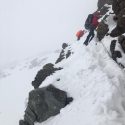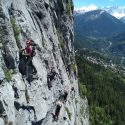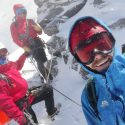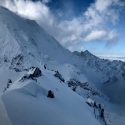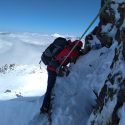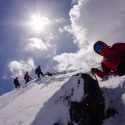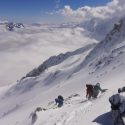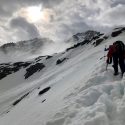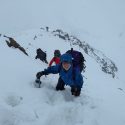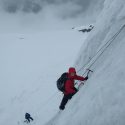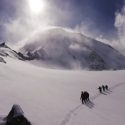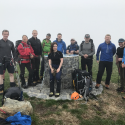On 7 Jun 19, 8 members of the AGC(ETS) deployed on a 9-day expedition to climb Mt Blanc in France. The aim of the expedition was to summit Mt Blanc, develop the next generation of AGC(ETS) mountaineers to participate in large-scale Army/Joint mountaineering expeditions in the future, and to highlight the opportunities available in the AGC(ETS) for recruitment and retention purposes.
Supported by a 4-strong instructor group including 3 x Reserve soldiers from the RAMC, AGC(ETS), the RAF and a locally-based British Mountaineering Guide (BMG), the group travelled from Worthy Down to Chamonix via the Channel Tunnel and the long drive through eastern France. Rather than staying in the Chamonix area, the expedition would acclimatise in Italy; within the Gran Paradiso National Park. Set just over the border, Gran Paradiso (4061m) is widely used by groups to prepare for its larger neighbour. Based out of the Chabod Hut (2750m), the expedition spent two days developing the rope work skills and conducting crevasse training to safely attempt the climb on Mt Blanc. The intent was to summit Gran Paradiso as well, but deep wet snow and strong winds made the attempt unachievable forcing the expedition to return back to the Chabod Hut and the Valsavarenche Valley.
A further failed acclimatisation attempt at the Torino Hut (3500m) due to thunderstorms meant the expedition moved back into France and the Chamonix valley without properly acclimatised at altitude. Anyone with any high-altitude experience understands acclimatisation is essential to deliver success in the high mountains. However, the weather gods had conspired against the expedition meaning the attempt on Mt Blanc would be even tougher.
Despite the issues, spirits were high as the expedition arrived at the Belvedere cable car, which would take us to the Gouter Ridge route starting point at 1900m. Weather conditions were not forecast to be particular helpful on route to the Tete Rousse Hut (3167m) with heavy snow and strong winds expected. These conditions severely hampered progression. The route to Nid D’Aigle (2300m) was fairly simple with a small element of snow cover in places. However, the remaining part of the route was tough. Heavy snowfall and deep snow on the route made the ascent to Tete Rousse treacherous and tested all the expedition members, including the instructors. This route is normally fairly easy with no snow and takes 3-4hrs to ascend. The expedition achieved it in 6hrs displaying bags of courage, determination and good mountaineering skills to navigate up the ridge in low visibility and blizzard conditions. We then hunkered down in the hut to enjoying a traditional alpine meal with a few other hardy groups had made the trip up to the hut (a large number of groups never made it due to the weather conditions).
Weather conditions did not improve with more heavy snowfall occurring overnight. Our BMG instructor and a few guides ventured a little further up the mountain to inspect the Grand Couloir. This is normally the most dangerous part of the mountain; where most deaths occur from rockfall. The Couloir was full of snow; a dangerous avalanche risk for anyone attempting to cross. The expedition leader in conjunction with the instructors decided this was a risk not worth taking; and made the decision to head back down the mountain. This decision was vindicated by no other groups attempting to cross the Couloir either. This was a major disappointment but the right decision; getting down the mountain from Tete Rousse would be hard in itself in the deep snow and strong winds.
Kitting up and operating in 4 x rope teams, the expedition slowly made their way back down the ridge. Conditions were testing and really pushed each individual and instructor to ensure each team got down the mountain safely. Descending, the ferocity of Mt Blanc and the surrounding ridges was made clear, as the slopes began to purge – huge avalanches thundering down the mountain due to the sheer amount of snow that had fallen overnight. This further focussed the expedition to get down the mountain safely back to Nid D’Aigle, the Belvedere cable car and a late booking at a Chamonix-based hotel.
With two days still available in the valley, the expedition conducted a day’s Via Ferrata activity. Many of the expedition had never attempted Via Ferrata before – a great activity high up on a rock face overlooking the valley. The expedition also attempted to plan a high ridge scrambling day up around the Aiguille du Midi (3800m) but was thwarted again by strong winds, which closed the cable car to the summit. Therefore, a day’s rock climbing was conducted in the valley before the long drive back to Worthy Down via the Channel Tunnel again.
Whilst Ex ALPINE TORCH didn’t achieve its aim to summit Mt Blanc, it was great expedition, which has proven to be an excellent recruitment and retention tool. The interest from current serving AGC(ETS) members to conduct further big mountaineering expeditions has been extensive; so much so, the Expedition 2IC is already putting together plans to return to Mt Blanc next year. Many of the expedition members are keen to return and two individuals have put their names forward to participate in the British Armed Forces expedition to climb Mt Everest in 2024.
The expedition unfortunately fell foul of some pretty poor weather conditions; the worst June weather in the Alps for a number of years. However, the conditions absolutely tested, not just the mountaineering skills of each individual and instructors, but also stretched the determination and motivation of every single part of the expedition. This ultimately is the aim of Adventure Training; to stretch Service Personnel so they develop to better soldiers, sailors and airmen on operations. The expedition also was incredibly beneficial for our Reserve instructors. All were highly experienced operators in the mountains as Alpine Mountain Leaders, but had not experienced such treacherous conditions as group leaders before. They learned a huge amount from the BMG instructor and all left better instructors from their experiences on ALPINE TORCH.
The Expedition Leader and the whole team would like to thank The Ulysses Trust with their support enabling us to deliver this expedition.

